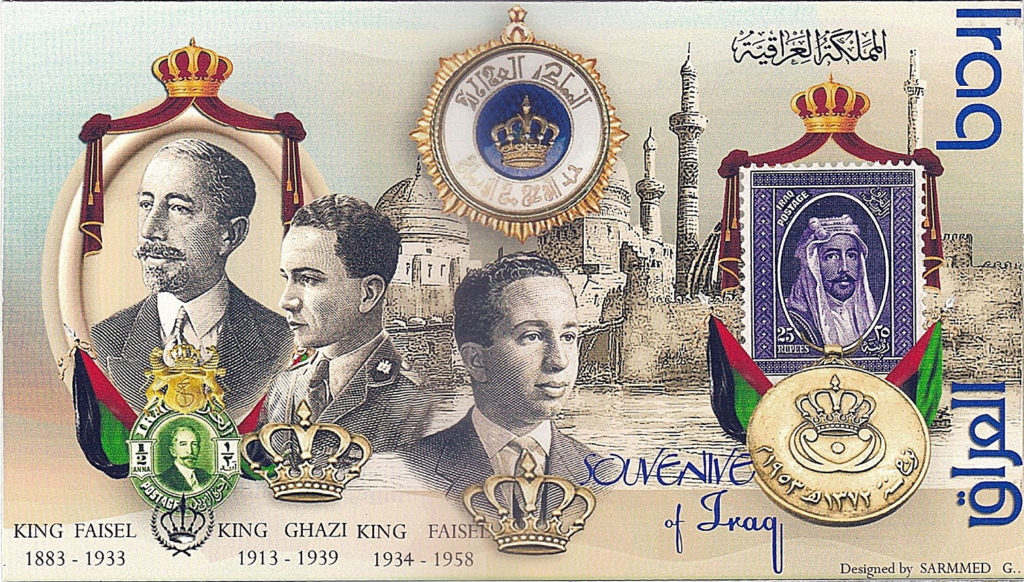Iraq’s postal history is deeply intertwined with its rich and tumultuous history, spanning from ancient Mesopotamian communication systems to the modern republic. This post explores Iraq’s postal evolution across four key periods: Indian Post Offices, issues for Baghdad and Mosul, and the nation’s transition through the League of Nations Mandate, Independent Kingdom, and Republic.
Iraq’s postal history is a testament to its complex history, spanning centuries of Ottoman rule, British influence, and eventual independence. This article examines Iraq’s philatelic journey, focusing on Indian post offices, issues for Baghdad and Mosul, and the broader postal developments under the League of Nations Mandate, the Independent Kingdom, and the Republic.
I. Indian Post Offices in Iraq
The origins of modern postal services in Iraq can be traced to the establishment of Indian post offices in Baghdad and Basra during the Ottoman period. These offices, opened on 1 January 1868, were part of the broader British effort to establish communication links between India and the Middle East.
Key Features:
- Usage of Indian Stamps: Unoverprinted Indian stamps were used, featuring numeral cancellations such as “356” and “18” for Baghdad and “357” and “19” for Basra.
- Operations Ceased: Both offices were closed on 30 September 1914 due to World War I. However, Basra’s office reopened in December 1914, using Indian stamps overprinted with “I.E.F.” (Indian Expeditionary Force).
These early operations laid the groundwork for Iraq’s modern postal system.
II. Issues for Baghdad
Following the British occupation of Baghdad on 11 March 1917, Ottoman stamps were overprinted with “BAGHDAD IN BRITISH OCCUPATION.”
Highlights:
- British Occupation: British and Indian forces occupied Basra on 22 November 1914 to secure oil pipelines. Their advance culminated in the capture of Baghdad in 1917.
- Overprinted Stamps: Ottoman stamps were surcharged with “BAGHDAD IN BRITISH OCCUPATION” as a temporary measure until the establishment of a localized postal system.
- Rare Issues: These overprinted stamps are highly prized among philatelists due to their historical significance and limited circulation.
III. Issues for Mosul
Mosul, a key city in northern Iraq, experienced unique postal developments following its occupation by British forces on 1 November 1918.
Key Points:
- Ottoman Stamp Overprints: Initially, Ottoman stamps were overprinted with “IRAQ IN BRITISH OCCUPATION.”
- Transition to Local Issues: These overprints were replaced by Nos. 1/8 during 1921–1922. However, the overprinted stamps were invalidated on 1 September 1922.
- League of Nations Resolution: In December 1925, the League of Nations formally awarded Mosul to Iraq, solidifying its place within the nation.
IV. Issues for Iraq
The broader postal history of Iraq during this period reflects its transition from British administration to independence.
League of Nations Mandate (1920–1932)
- Mandate Assignment: On 25 April 1920, the Supreme Council of the Allies assigned Iraq to British administration under the League of Nations Mandate.
- First Iraqi King: Emir Faisal, former King of Syria, was proclaimed King of Iraq on 23 August 1921.
- Philatelic Development: Stamps during this period featured Ottoman designs overprinted with “IRAQ IN BRITISH OCCUPATION” before transitioning to stamps bearing King Faisal’s portrait and other national symbols.
Independent Kingdom (1932–1958)
- End of Mandate: Iraq achieved independence on 3 October 1932, becoming a sovereign kingdom under King Faisal I.
- King Ghazi: Following Faisal’s death, King Ghazi ruled from 8 September 1933 until his untimely death on 4 April 1939.
- Stamp Themes: Commemorative issues celebrated Iraq’s sovereignty, infrastructure development, and cultural heritage.
Republic (1958–Present)
- Formation of the Republic: The monarchy was overthrown in 1958, leading to the establishment of a republic.
- Modernization: The postal system adapted to the new political reality, issuing stamps reflecting national achievements in agriculture, industry, and education.
Explore Iraq’s Stamp Issues by Year
Iraq stamps provide a fascinating lens into the country’s history, culture, and achievements. To dive deeper into the evolution of Iraq postal history, explore our comprehensive lists of stamp issues from different periods:
1923 – 1958 1959 – 1964 1965 – 1966 1967 – 1969
1970 – 1971 1972 – 1974 1975 – 1977 1978 – 1979
1980 – 1982 1983 – 1986 1987 – 1988 1989 – 1992
Conclusion
The postal history of Iraq is a fascinating journey through colonial influence, nation-building, and modernization. From the Indian post offices that established foundational practices to the bespoke issues for Baghdad, Mosul, and Iraq as a whole, each period reflects the nation’s evolving identity. Today, Iraqi stamps remain a valuable resource for historians and collectors, preserving the legacy of a nation shaped by its rich history and diverse cultural heritage.


